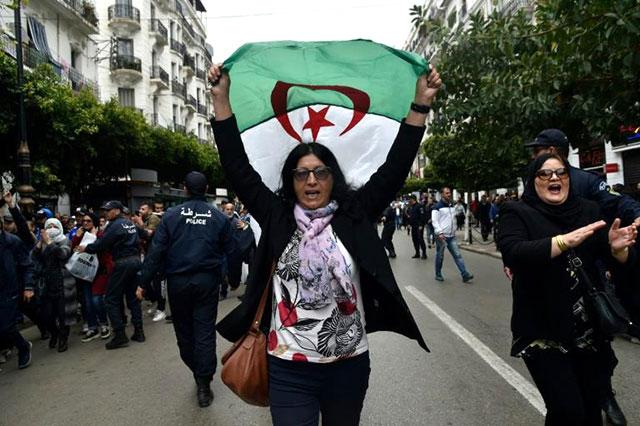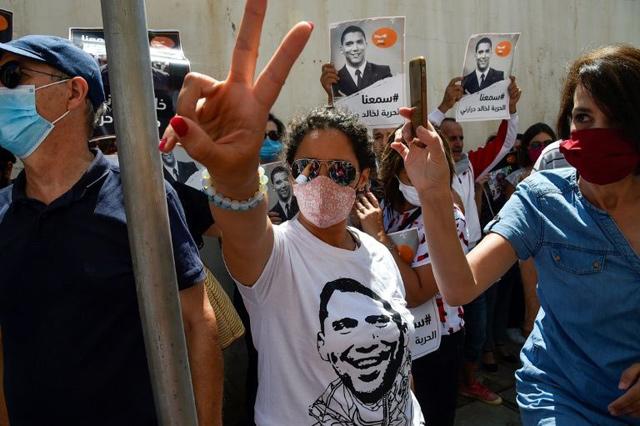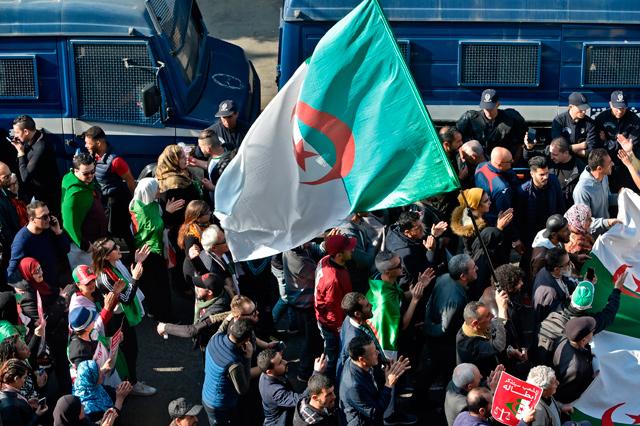You are here
Algeria regime exploits virus to defeat protesters-- analysts
By AFP - May 11,2020 - Last updated at May 11,2020

An Algerian woman waves a national flag as she takes part in an anti-government demonstration in the capital Algiers on March 14 (AFP photo)
TUNIS — The Algerian regime is exploiting coronavirus to defeat a protest movement that has shaken it to its core over the past year, analysts say.
Despite protesters deciding to suspend their weekly gatherings since the start of the public health crisis, repression of regime opponents has persisted.
Security forces have targeted young bloggers, independent journalists, online media and activists from the "Hirak" protest movement.
Rapidly adopted laws ostensibly aimed at preventing the dissemination of false news and hate speech have further stoked fears of an orchestrated campaign to muzzle free expression.
The new laws "aim to repress citizens' freedom of expression", said lawyer and activist Abdelouhab Chiter, a lecturer at the University of Bejaia.
A law on "spreading false information", he said, "was debated and passed by parliament in a single sitting, in the absence of almost half of its members".
Akram Belkaid, a journalist for the Oran daily, warned of "a return to the iron fist as in the 1970s".
"Hirak won the first leg of the game," he said.
"The regime is on course to win the second leg, and its true goal is to prevent any further rematches being held at all -- or in other words, to prevent protests reoccurring once the pandemic has been overcome."
Police and judicial harassment
Karima Direche, a historian specialising in contemporary Maghreb region affairs, said the pandemic was "bread from heaven for the regime".
"The confinement period lends itself to police and judicial harassment. This explains the dozens of arrests of known and unknown people in all Algeria's cities," she said.
The protest movement, calling for the full-scale overhaul of a system in place since independence in 1962, scored one major success: it toppled president Abdelaziz Bouteflika after two decades in power.
Members of the unprecedented, leaderless and diverse movement had vowed to continue their mass demonstrations "until they're all gone!"
On Sunday, hundreds of people staged a rare protest despite the virus pandemic near Tizi-Ouzou in the northeastern Kabylie region to denounce the arrest of Hirak activists by the police, according to social media reports.
"It is a rally of support for five activists summoned" by the police, opposition MP Mohamed Cherif Fahem who took part in the protest in the rural community of Trizi Gheniff, said on his Facebook page.
"The authorities are taking advantage of the [health] crisis to intimidate people and summon activists in the hope of aborting the Hirak," the lawmaker added.
President Abdelmadjid Tebboune, elected in a poll that drew less than 40 per cent turnout, has said that "a true democracy [is built on] a strong state with justice and national cohesion".
He also cites "national sovereignty" to justify censorship measures against websites he accuses of being in the pay of foreign organisations.
In the face of Tebboune and the army, which Direche sees as more influential than ever, the political opposition is weak and divided.
"The regime has won on the ground, consolidated by the reprieve offered by the pandemic and the absence of an alternative vision," writer Kamel Daoud told the Swiss daily Le Temps in late April.
But, he noted, there is "not one regime, but several, competing among themselves -- some tempted by real reforms, others set on accumulating ever more control".
'Ideas don't die'
And while its adversaries may have been weakened, the regime has been hit by the double blow of the novel coronavirus and a collapse in oil prices.
As crude sales account for 90 percent of the state's foreign revenues, that is likely to necessitate deep spending cuts, risking economic disaster and further social discontent.
"The government is more concerned with reviving economic, social and educational activity than any resurgence of the Hirak," said Mansour Kedidir of the Research Centre for Social and Cultural Anthropology (CRASC) in the second city Oran.
By implementing promised constitutional and institutional reforms, Tebboune "plans to breathe new life into the economy and establish credit in society", Kedidir said.
"It'll be a tough job."
Tebboune plans to insert a mention of the "blessed Hirak" in the preamble of the constitution, effectively declaring it over.
A prominent campaigner for the release of detained protest figure Karim Tabbou, the biomedical researcher Asma Mechakra, said the government wants to use the health crisis and the lockdown to "break up" the Hirak.
"But the regime fails to see that the Hirak is all about ideas and ideas don't die," she told AFP.
"Maybe my generation won't see the change, but we will have laid the groundwork for the blossoming of a new Algeria."
Related Articles
ALGIERS — For over a year Algeria's defiant anti-government "Hirak" protestors seemed unstoppable, but weekly demonstrations skidded to a ha
ALGIERS — On February 22, 2019, sudden and unprecedented protests swept Algeria.
ALGIERS — A leading Algerian opposition activist has been detained and is to appear before prosecutors on Thursday, his lawyer said, weeks














